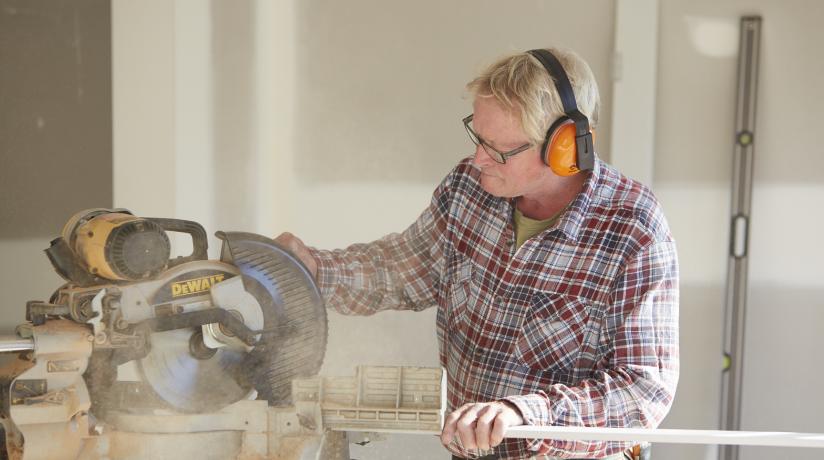Master Builders Victoria has provided its submission to the Department of Environment, Land, Water and Planning (DELWP) in response to their Options Paper for Registration and Licensing of Carpenters. The submission was based on feedback received from our sector committees, member engagement workshop and member survey.
The submission can be accessed below.
Master Builders have long supported the introduction of a mandatory trade registration system that is simple, effective and practical in its approach to ensure the quality of construction work conducted. As part of our submission, we also reflect on the importance of minimising duplication and administrative burden so that a system that provides little disruption to industry is effectively implemented.
Thank you to the members who responded to the survey and attended the member engagement workshop. Your feedback was invaluable in aiding our consultations with DELWP.
Introduction
Master Builders Victoria (‘MBV’) is the leading voice in building and construction and welcomes the opportunity to provide input into the options paper on the registration and licensing of tradespeople who perform carpentry work.
MBV represents approximately 8,000 stakeholders from across the building and construction industry, including large and small builders and tradespeople across the domestic and commercial sectors, as well as apprentices, suppliers and manufacturers.
With more than 140 years of experience, MBV delivers meaningful industry representation by harnessing feedback from our board of directors, committees, as well as our members more broadly through member engagement workshops and surveys.
MBV has long supported the introduction of a domestic mandatory trade registration system that is simple, effective and practical in its approach to ensure the quality of construction work conducted. We have in the past, advocated mandatory registration for trades that have been identified as having significant quality gaps and are deemed important to a building’s structural integrity such as carpentry.
We have noted in our previous submission and past consultations the importance of developing well-defined scopes of work conducted in the building and construction industry as part of the introduction of the new mandatory subcontractor registration and employee licensing regime. Given the complexity of this task, it is important that duplication and administrative burden is minimised and that a system that provides little disruption to industry is effectively implemented.
Notwithstanding our opposition to the introduction of employee licensing due to its detrimental effect towards the cost of construction, we note the government’s commitment to its introduction. As such, in order to facilitate quality consistency across the industry, it is important that qualification and experience requirements are the same for both subcontractor registration and employee licensing of carpentry work. This will also prevent possible distortions of the labour market caused by different requirements for subcontractors and employees.
The aforementioned points will guide our responses to the following consultation questions.
1. Scope of work
1.1 What carpentry work should only be performed by subcontractors or employees with a registration or licence?
MBV believes it is important that the scope for carpentry work remains clear and well defined. As such, we therefore note that all carpentry work should be prescribed based on the existing Domestic Builder Limited (DB-L) categories. This will minimise industry disruption given that such categories are already in place.
2. Class of practitioner
2.1 Which classes of practitioner should be included in the new scheme?
It is important to note that while the current categories of carpentry work for the domestic sector are well-defined, this is currently lacking in the non-domestic building sector. MBV members have advised that contractors often work across the two sectors and therefore any new registration and licensing regime must take this into account. As such, developing new broad classes of subcontractor registration for carpentry that cover both domestic and commercial work is required to minimise red tape and extra fees for subcontractors and employees, using the existing DB-L categories as the basis. It will also allow for effective labour mobility across the building and construction industry.
3. Registration and licensing exemptions
3.1 What aspects of carpentry work are commonly carried out by non-carpenters? What aspects of carpentry work should be able to be undertaken by people without a registration or licence? Who should be able to undertake these types of work?
MBV reiterates that in order to avoid an overly complex and prescriptive registration regime, the current DB-L categories are appropriate in ascertaining what areas of carpentry should be required for mandatory registration.
There should be allowances for labourers, trade assistants, and students undertaking work experience. Consideration should also be made on exemptions conducted by other states.
3.2 What criteria (including experience and formal qualifications) should be required for a supervised registration or supervised licence?
MBV supports the introduction on a supervisor registration and licence. Our members also support the introduction of the ‘Clerk of Works’ or similar position.
We would need more information on what scope of work this registration would be responsible for before we could recommend qualifications and experience.
4. Qualifications
4.1 What formal qualifications requirements should apply to subcontractors and employees?
MBV believes that the prescribed qualifications should be the Certificate III in the relevant field. This qualification would be relevant for both subcontractors and employees. MBV believes that if an applicant does not hold the formal qualification, then the deemed equivalent onsite experience or an equivalent qualification would meet the formal requirements.
5. Relevant practical experience
5.1 What relevant practical experience requirements should apply to subcontractors and employees?
MBV notes that the completion of the Certificate III in Carpentry apprenticeship (4 years) is considered adequate in meeting the relevant practical experience requirements. It is not an uncommon practice within the industry for the employer to no longer employ the apprentice upon the completion of their apprenticeship. This decision is most commonly made by the employer, not the apprentice, owing to the increase in labour costs.
As such, requiring additional years of practical experience past the completion of the apprenticeship to become a registered subcontractor risks limiting options for both employer and worker, thereby distorting the labour market.
5.2 Should subcontractors and employees meet lower experience requirements than head contractors?
Yes, there should be lower experience requirements than head contractors for subcontractors and employees. Our recommendation is that experience requirements obtained in the apprenticeship should meet the requirements for subcontractors and employees.
5.3 Should subcontractors and employees have different experience requirements?
No, both subcontractors and employees should have identical experience requirements in order to facilitate consistency of quality in the skills and work done across the industry. Current industry practices see both subcontractors and employees having the same experience requirements upon completion of their apprenticeship. As noted in question 5.1, it is commonplace within the industry for employers to discontinue employing the apprentice upon completion of their apprenticeship due to the subsequent increase in labour costs. As such, requiring additional years of experience to become a registered subcontractor compared to a licensed employee risks more apprentices becoming licensed employees over becoming a registered subcontractor. Identical experience requirements will remove labour market distortion and ensure a more mobile workforce.
6. Business competency
6.1 What business competency units (if any) should apply to subcontractors?
MBV strongly believes that there should not be additional business competency units required for subcontractor registration. We are concerned that prescribing business units to subcontractor registration may discourage carpenters from applying for subcontractor registration. As such, identical experience requirements between subcontractors and employees is required to remove labour market distortion and ensure a more mobile workforce.
If business units are added to requirements for subcontractor registration, this may result in carpenters to instead apply for their registration in NSW where only trade papers are required, and then apply for Mutual Recognition in Victoria.
6.2 Should subcontractors have different business competency units than head contractors?
If business units are prescribed to subcontractors, then MBV would advocate that the same units be added into the Building Regulations 2018 for head contractors. Currently, DB-Ls are not asked to show prescribed business units and yet they are operating businesses and are dealing directly with clients.
7. Personal probity
7.1 What personal probity requirements (if any) should apply to subcontractors?
MBV notes that personal probity requirements for subcontractors should not prevent the registration of a subcontractor. It would be considered unfair for a subcontractor to not be able to get registered due to past criminal history despite already having been rehabilitated through serving time in the justice system.
In addition, MBV contends that the time period for consideration as part of personal probity requirements, if it is introduced, should be 5 years prior to the application for registration. This is consistent with current practice for applications for Public Liability Insurance.
8. Financial probity
8.1 What financial probity requirements (if any) should apply to subcontractors?
MBV contends that financial probity requirements outside of eligibility for Public Liability Insurance, is not required for subcontractors.
9. Proposed transition arrangements
9.1 What are the key transition issues and appropriate timeframes?
We understand that the new regulations as they relate to mandatory registration and licensing of tradespeople will commence on 1 September 2020. However, we note the importance of providing industry participants ample time to plan and prepare for the new changes. This has become an even more critical point given the current situation concerning COVID-19 which has presented itself as a significant challenge for industry.
As such, we believe that the new registration and licensing scheme should commence at least in July 2021 to ensure that adequate time is provided to properly communicate these new legislative changes to industry. It will also allow RTOs and builders adequate time to prepare and cope with the volume of applications.
9.2 What circumstances (if any) would warrant extension of a provincial registration or licence?
Examples would include the current COVID-19 crisis and the measures implemented by government in dealing with it. In addition, significant family issues such as serious illness or death of a family member.
9.3 Are there any other carpenter profiles that need to be considered for specific transition arrangements?
Tradespeople that erect fences, cabinet makers, joiners and those that build staircases, should be considered. In addition, framers and people that erect shade structures and sheds should also be considered.
Conclusion
MBV have long supported the introduction of a mandatory trade registration system that is simple, effective and practical in its approach to improve quality, with the initial focus on trades integral to the structure of the building such as carpentry. As outlined in our submission, when implementing a new registration and licensing regime for the Victoria building and construction industry, consistency of quality across the industry and reducing administrative burden for building practitioners applying for registration, should be key areas of focus.
Where required, MBV will continue to make available our industry expertise to assist government in defining the scopes of work, training pathways, and other relevant elements for carpentry work, as well as for other trades.
Contact details
For further information regarding this submission, please contact the following Master Builders Victoria team members:
· Ingrid Mountford, Careers and Registration Manager, : [email protected] (03) 9411 4588
· Victoria Giddens, Builder Registration Advisor, : [email protected] (03) 9411 4555
· Kevin Hoang, Policy Advisor, : [email protected] (03) 9411 4531






